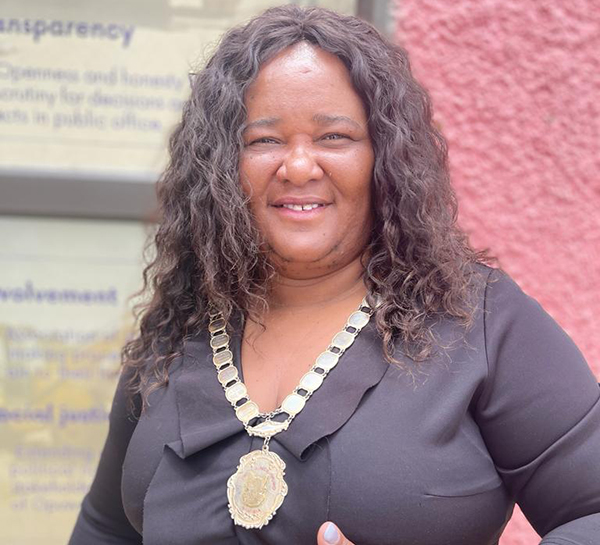OPUWO – Director-General of the National Planning Commission Obeth Kandjoze has advised Namibians with hidden agendas to refrain from pushing away investors. Speaking during a regional awareness programme on green hydrogen in Opuwo in the Kunene region on Friday, he said no investor comes to a country with a risky environment.
Responding to Opuwo community members’ concerns relating to corruption and timely information-sharing, which were some of the issues raised by those attending a public gathering last week, Kandjoze said the government is well-aware of the corrupt activities such as the Fishrot scandal, but reiterated that Namibia has processes, systems and institutions to deal with this.
“Those saying government is corrupt should be careful. There is no way investors would show interest in a corrupt country. Investors are very sensitive, so let us take care of what we say. Such negative comments can scare them away, and we will be left here with our resources,” he stated.
The NPC DG also focussed on green hydrogen, which he referred to as the new anticipated engine of growth for the domestic economy. Kandjoze elaborated that green hydrogen is anticipated to revive regions such as Kunene that have been recognised for the potential to host Namibia’s green hydrogen hub. Kunene has the much-needed wind and solar potential near the Skeleton Coast.
According to the 2021 Multidimensional Poverty Index released by the Namibia Statistics Agency, which provided a lucid indication of the geographical areas hardest-hit by poverty, Kunene stood out with the highest poverty rate at 64.1%. This was in part attributed to a devastating drought which decimated the livelihoods of many people who were dependent on livestock farming. During his presentation in Opuwo, Kandjoze observed that the region’s potential could be unlocked and massive contributions could be made to its economy through job creation.
“It may take time, but it will come. Please send kids to school, and don’t keep them behind cattle. Green hydrogen is for everyone,” he said. He added that the country is holding numerous discussions with investors to ensure a green hydrogen deal benefits all parties.
Furthermore, Kandjoze explained that his Kunene region visit comes after the country’s first large-scale vertically- integrated green hydrogen project is being implemented by Hyphen Hydrogen Energy (Hyphen) in southern Namibia.
This investment project is planned to be developed in phases, with the full development targeting 300 000 metric tonnes of green hydrogen production a year from 5GW to 6GW of renewable generation capacity and 3GW electrolyser.
During the DG’s presentation, an elder in Opuwo, Iningirua Musaso, asked: “With all these good things you are telling us, how will this electricity reach our houses deep in the village? How will you also ensure corruption is tackled properly this time around?”
Economic diversification
At the same occasion, Kandjoze made a presentation on how Namibia is at a desperate juncture in its economic development for the introduction of a diversification strategy as the country cannot rely indefinitely on its natural resources and volatile commodity prices for growth.
He noted that from 15 May 2020 to 15 May 2021, a study was conducted to investigate the diagnostics of the Namibian economy, and what could be done to improve productivity.
The NPC DG said through the diversification strategy, Namibia must be able to identify new engines of growth. This would be achieved by identifying high-potential opportunities, and to link these to policy frameworks for sustainability and employment.
He revealed that the diversification strategy identified 97 products to produce or to add value to, as these have the potential to drive economic growth.
Meanwhile, the 97 products have been split into five categories, namely chemicals, food, mechanicals, items related to minerals as well as transport and logistics.
Kandjoze further outlined the most challenging aspects and binding constraints as inclusion, growth, fiscal needs and missing skills’ challenges.
Kunene development budget
Also speaking to the community in Kunene, NPC’s national development advisor in sectoral planning Leena Sindano confirmed that there are 62 ongoing projects. However, she admitted that most of these projects are moving at a slow pace, with an overall execution rate of 14.35%.
“Financial challenges are delaying these projects as there is limited funding, particularly for larger projects. Another challenge is high virementation trends from development to operational budget. Thirdly is the high cost of projects”.
Sindano further noted that the development budget plays a vital role in socio-economic development, hence the need to ensure the full implementation of projects, emphasising that effective implementation requires the concerted efforts of all stakeholders.
“The current economic environment limits the number of projects to put on the budget, thus a need to embrace alternate funding modalities such as the private sector, public-private partnership models and development partners,” she advised.



